The Rat and a Crab
Reading Time: 8 min
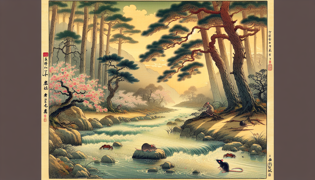
About Story: The Rat and a Crab is a from japan set in the . This tale explores themes of and is suitable for . It offers insights. A Japanese folktale about a rat and a crab whose friendship is tested by greed and selfishness, teaching lessons on sharing and the consequences of betrayal in a simple yet profound narrative.
Introduction
A fine mist lingered above the pebbled riverbank as dawn broke like a shy lantern in the sky. The scent of damp earth and pine needles clung to the air while a distant owl’s soft hoot merged with the murmur of water. Near a moss-grown boulder, a small crab scuttled with the precision of a dancer polishing each step. Not far off, a rat with glossy fur as dark as midnight paused, its whiskers quivering like tiny flags. By fate or fortune, they met beneath a blossoming cherry tree. The crab bowed politely, and the rat tipped an imaginary hat in return. At first, their friendship seemed as delicate as the petals overhead.
Over shared tales and foraged berries, they built trust faster than water coils around a stone. The crab admired the rat’s quick wit; the rat respected the crab’s unerring loyalty. They laughed when a pair of cicadas launched a midnight duet; they consoled one another when heavy rain washed away the crab’s sandcastle. Their bond felt stronger than any knot of rope. Yet, behind bright camaraderie, the shimmering prospect of gold lay hidden in a distant merchant’s pouch. As the sun climbed, so did the murmur of desire.
Even monkeys fall from trees, and even the surest hearts can slip if tempted by lustrous coins. A subtle rustle in the marketplace would soon test the seams of their friendship, revealing that greedy whispers can crack the hardest shell. The world, like a swirling pond, reflects both loyalty and betrayal, and the rat and crab were about to learn how bitter the reflection could become.
(Sensory micro‑detail: the coppery tang of coins in the merchant’s hand seemed almost audible, a low clink like impatient raindrops.)
1. An Unlikely Bond
Under a moonlit sky, the rat and crab shared a morsel of jasmine rice left by a wandering monk. The rice smelled of comfort and distant incense. The rat’s whiskers twitched as he recounted tales of daring night raids on granaries; the crab clacked its claws in admiration. The friendship that sprouted that night was slender as a reed, yet it held firm under the river’s current.
Each day, they explored hidden inlets and overhung caves. The crab introduced the rat to the taste of freshwater snails—slippery pearls with a gentle crunch—while the rat showed the crab how to climb a low branch for listening to the forest’s whispers. They kept each other warm when autumn winds blew like silver knives, and shared stories that glittered in the gloom.
But word of a peddler’s golden trinkets drifted on the breeze, as light as cherry petals in spring. The rat’s dark eyes flickered with desire; the crab felt a clammy dread, as though a cold shadow had crept between them. Yet neither spoke of the change in the air, nor the uneasy tension that crackled like dry leaves underfoot.
A sense of foreboding saturated the mist. Even monkeys fall from trees, they told themselves with forced laughter. But the seed of greed had been sown. Each clink of distant coins sounded like a hammer tapping at the gate of their trust. Still, they pressed on, unknowing that soon one would slam it shut.
(Sensory micro‑detail: in the hush of pre-dawn, the scent of wet moss felt cool against their fur and shell as they ventured downstream.)
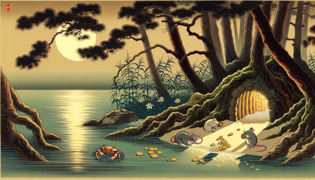
2. The Merchant’s Gold
At the village edge, a merchant’s stall gleamed like a pool of sunlight. Rows of tiny gold coins winked in lantern light. The merchant—a gaunt man with a hawk‑like nose—extended a velvet pouch that smelled of spice and ambition. The rat’s heart thundered like a festival drum; the crab eyed the metal discs with quiet alarm.
"Only one to each," the merchant declared, voice as smooth as polished wood. The rat couldn’t resist. He snatched the pouch while the merchant counted his wares. Then, like lightning in water, he darted away. The crab pursued, claws clicking, but arrived too late: the rat had vanished among lantern-lit stalls.
The crab’s shell felt suddenly as heavy as regret. Echoes of their laughter flickered like dying embers. The merchant’s distant chuckle was a blade sliding across silk. How could his friend betray him for lustrous metal? The crab sank onto a stone, waves lapping softly like whispered taunts. The golden coins in the pouch mocked him, each one a lie, each one a wound.
In anger and sorrow, the crab vowed to teach the rat the price of deceit. He poured out the stolen coins into the river; they tumbled away like fallen stars. Even monkeys fall from trees, he muttered, but this time the lesson would burn brighter than any lantern.
(Sensory micro‑detail: the pungent aroma of burning pine torches mingled with the metallic tang of gold as the rat fled.)
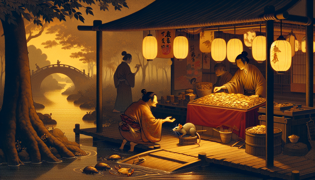
3. Retribution Among Reeds
The crab scuttled into the reed beds, summoning allies beneath billowing grasses. A carp surfaced with a ripple like silk tearing. A heron stood motionless, wings curved as delicate fans. Even the water beetles rallied in hushed murmurs above the mirrored surface. Together, they devised a plan that shimmered like moonlight on ripples.
At nightfall, the rat crept back to the riverbank, eager to stow his ill-gotten gains. He sniffed the air—wet moss and displaced stone—but sensed no threat. Suddenly, ripples exploded as the carp surged, spraying icy droplets. From the reeds emerged the heron, its beak curved like a scythe. The rat froze, heart pounding like festival drums. Before he could flinch, the heron snatched the pouch, tossing it to the carp. The coins spilled back into the water, dancing away in a glittering stream.
Humiliation sank into the rat’s chest like a stone dragged beneath the river. The crab stalked forward, claws raised not in vengeance, but in sorrow. "Even the tiniest shell has strength," he murmured, voice softer than falling petals. The heron tilted its head, the carp flicked a fin, and the water beetles hummed in serene chorus.
Under their combined gaze, the rat bowed, tears pricking his whiskers like dew on grass. Even monkeys fall from trees, he whispered, at last understanding the weight of betrayal. He begged forgiveness as dawn brushed the sky with pale rose, promising to restore what he had taken.
(Sensory micro‑detail: the heron’s wings stirred the chill night air, carrying the scent of reeds and distant sea salt.)
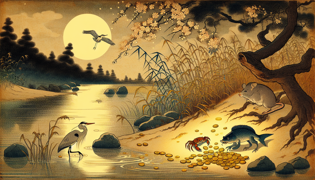
4. Restoration and Share
At sunrise, the river carried only a few coins to the shore. The crab gathered them, each one duller than before. The rat arrived, head bowed, paws trembling like autumn leaves. "I have learned," he said, voice hushed as a morning breeze, "that friendship outweighs the gleam of gold."
They worked together, foraging berries and nuts to resupply the merchant, returning what little they could. The merchant—a stern figure under his straw hat—counted the meagre coins before raising a single eyebrow. Then he grunted and handed them a handful of rice cakes, each wrapped in paper scented with plum blossoms. "花より団子," he muttered, offering substance over show.
The crab cracked a claw in gentle laughter; the rat nibbled a rice cake, its sweetness like hope returning. Their bond, tested by greed, had been tempered like steel in fire. They shared those rice cakes under the cherry tree, petals drifting like paper lanterns on a breeze.
From that day forward, they foraged and played, never forgetting the lesson of the gold: that true wealth comes from trust and shared hardship. Even monkeys fall from trees, but only those who learn to climb again know the value of every branch.
(Sensory micro‑detail: the tart fragrance of plum blossoms drifted through the dawn air, and the rice cakes felt soft as cloud under fingers.)
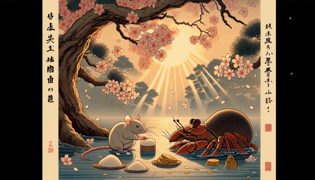
Conclusion
Beneath the gentle whisper of cherry blossoms, the rat and crab discovered that the wealth of friendship outshines the brightest treasure. The crab’s steadfast loyalty and the rat’s humbled heart shone like twin lanterns guiding lost souls through darkness. From that moment, their bond was as enduring as the river’s song, carrying tales of forgiveness downstream to every corner of the forest.
They learned that greed is a brittle shell, easily cracked by remorse and compassion. And though even monkeys fall from trees, one can rise again with wiser paws and steadier steps. Sometimes, the simplest lessons—shared rice cakes, earnest apologies, quiet camaraderie—resonate more profoundly than legends carved in stone. The river heard their laughter anew, and the reeds bowed in approval.
So, when you seek fortune, remember the crab’s steadfast claw and the rat’s contrite bow. Cherish those who stand by you in storm and sunlight, for true riches lie not in gold but in hearts unbroken. Even in the smallest of creatures, one may find courage enough to forgive and strength enough to change. Such is the legacy of the Rat and a Crab, a humble fable rippling across time like a pebble cast into a placid stream.

















